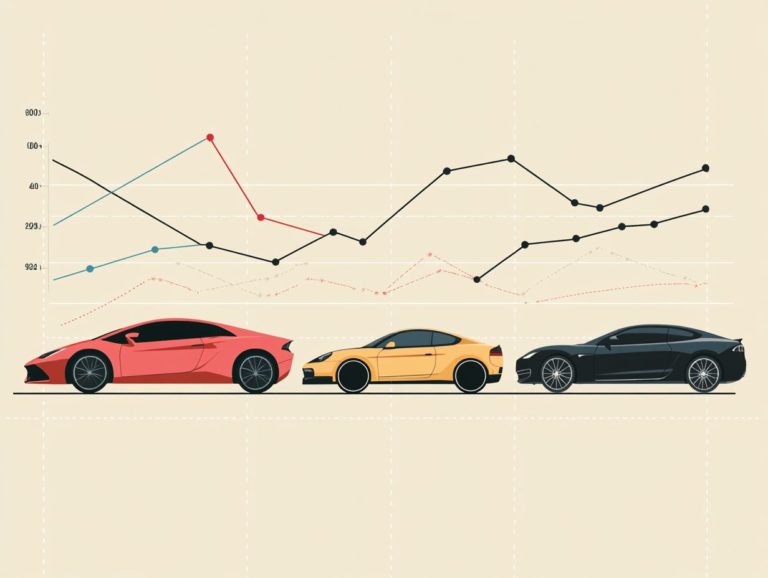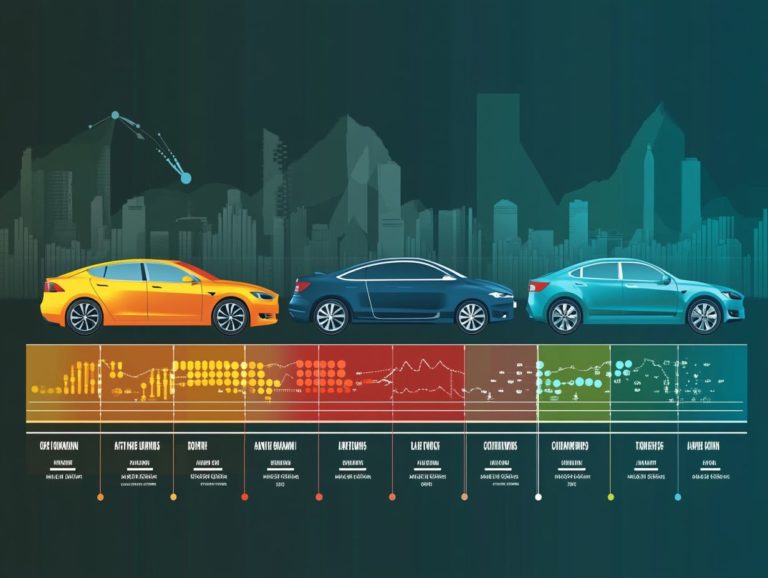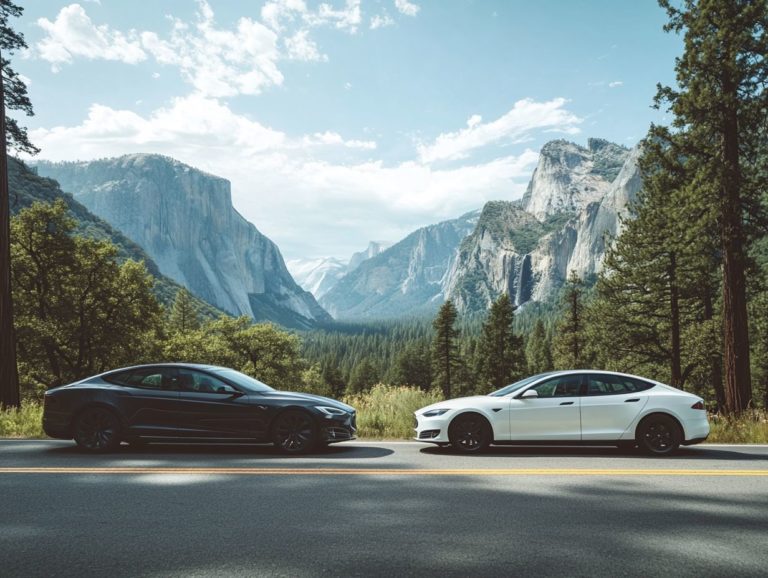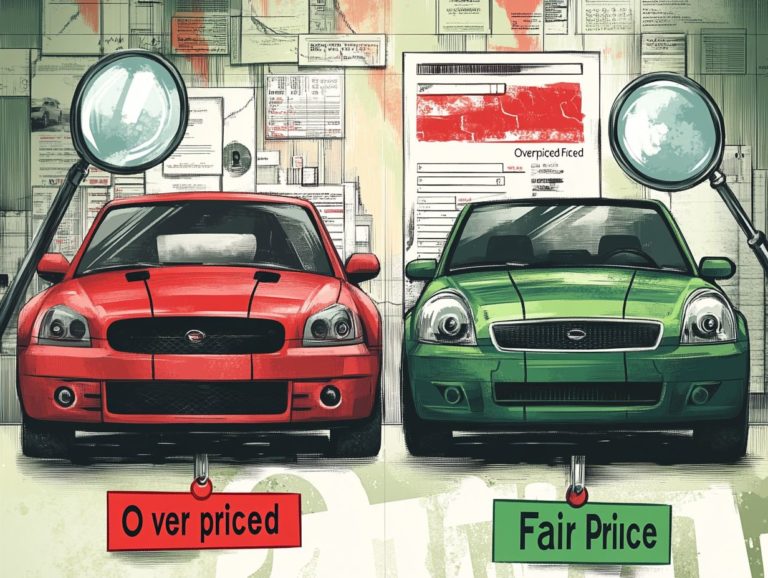Electric vs. Gasoline Cars: Price Comparison
As the automotive landscape evolves, the decision between electric and gasoline cars takes on greater importance.
Understanding the differences in technology and how each type works is important. The financial implications from initial purchase prices to long-term maintenance can significantly influence your choice.
This article delves into the costs associated with both vehicle types, examines the factors that affect their prices, and offers guidance on selecting the right car that aligns with your budget and lifestyle.
Check out these insights now to make a smart choice!
Contents
- Key Takeaways:
- Overview of Electric and Gasoline Cars
- Cost Comparison of Electric and Gasoline Cars
- Factors Affecting the Price of Electric and Gasoline Cars
- Choosing the Right Car for Your Budget
- Frequently Asked Questions
- 1. What is the main difference in price between electric and gasoline cars?
- 2. Are there any government incentives or tax breaks for purchasing an electric car?
- 3. How do long-term maintenance costs differ between electric and gasoline cars?
- 4. Do electric cars save money on fuel compared to gasoline cars?
- 5. Are there any additional costs to consider when purchasing an electric car?
- 6. Which type of car is more affordable in the long run: electric or gasoline?
Key Takeaways:
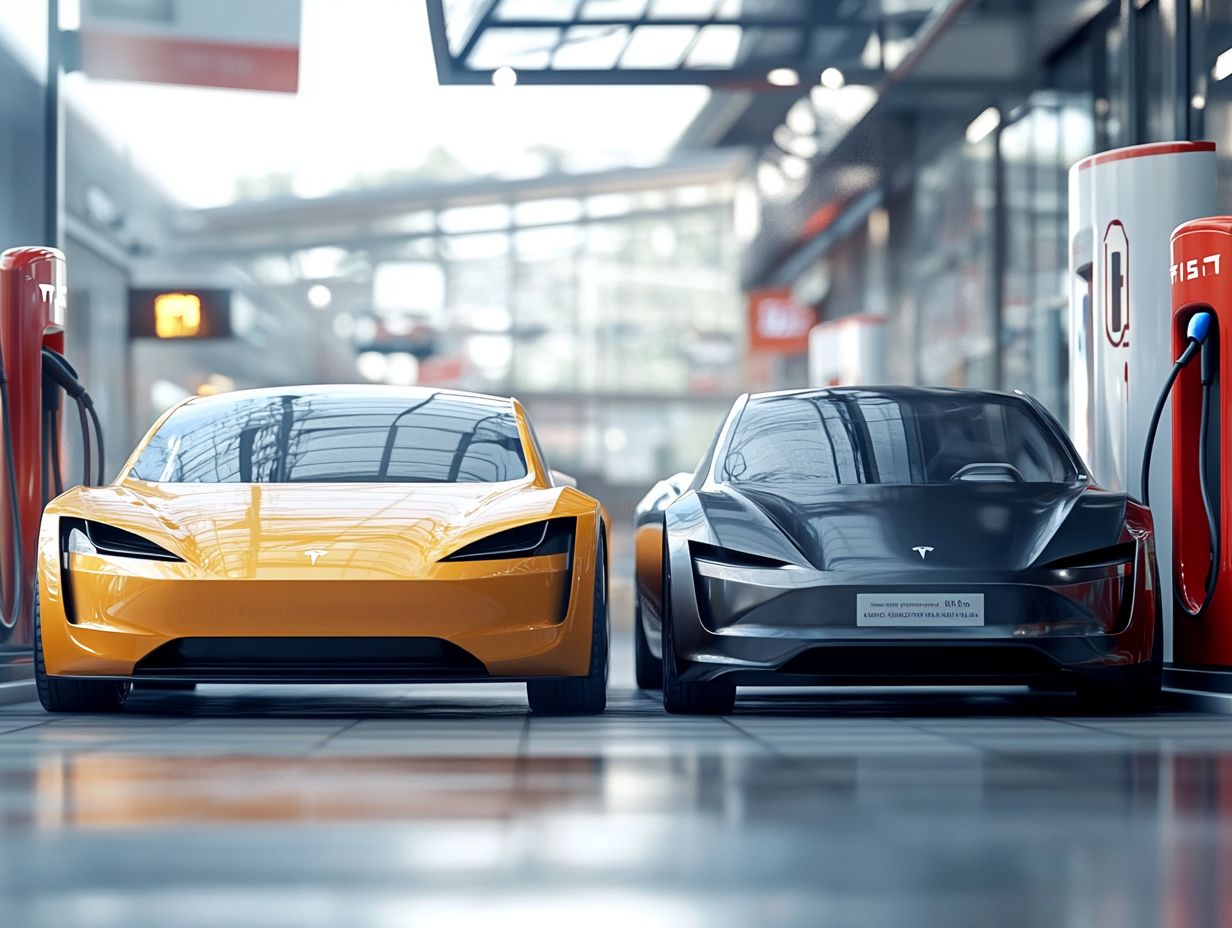
- Electric cars may cost more upfront, but they save you money on maintenance and fuel in the long run.
- Consider government incentives, charging options, and resale value when comparing prices.
- Your choice should reflect your needs and budget to find the best fit for your lifestyle.
Overview of Electric and Gasoline Cars
The discussion surrounding electric vehicles (EVs) versus gas cars has become more pronounced as you, along with consumers and policymakers, place greater emphasis on long-term savings, environmental considerations, and technological innovations in transportation.
While electric vehicles present substantial benefits in energy efficiency and lower carbon emissions, top electric cars can often have higher initial purchase costs compared to gas cars, which continue to hold sway due to the comfort of familiarity.
By understanding the dynamics of the evolving EV market including advancements in battery technology and the latest state and federal tax incentives you can enable yourself to make well-informed financial choices for your next vehicle acquisition.
Differences in Technology and Functionality
Electric vehicles and gas cars differ fundamentally in their technology and functionality, impacting everything from energy efficiency to your driving experience.
Electric vehicles utilize advanced battery technology and systems that recover energy when braking, enhancing vehicle range and reducing overall energy consumption. In contrast, gas cars operate on traditional engines that burn fuel, resulting in distinct fuel economy profiles.
The batteries that power electric vehicles work tirelessly to deliver not just power but also remarkable efficiency, allowing for quicker acceleration and a smoother ride. Meanwhile, the internal combustion engines of gas cars generate power through fuel combustion, which can lead to higher greenhouse gas emissions and increased maintenance needs.
These technological distinctions between electric and gas vehicles are profound, influencing both environmental impact and your overall convenience as a driver.
Cost Comparison of Electric and Gasoline Cars
When comparing the cost of ownership between electric vehicles and gasoline cars, it’s essential to look beyond just the initial prices and sticker shocks. Using a price comparison for eco-friendly vehicles can help you factor in the long-term savings associated with maintenance, charging, and fuel expenses.
By grasping the total cost of ownership, you can uncover those often-overlooked expenses, enabling you to make well-informed financial decisions about your vehicle purchase.
Initial Purchase Price
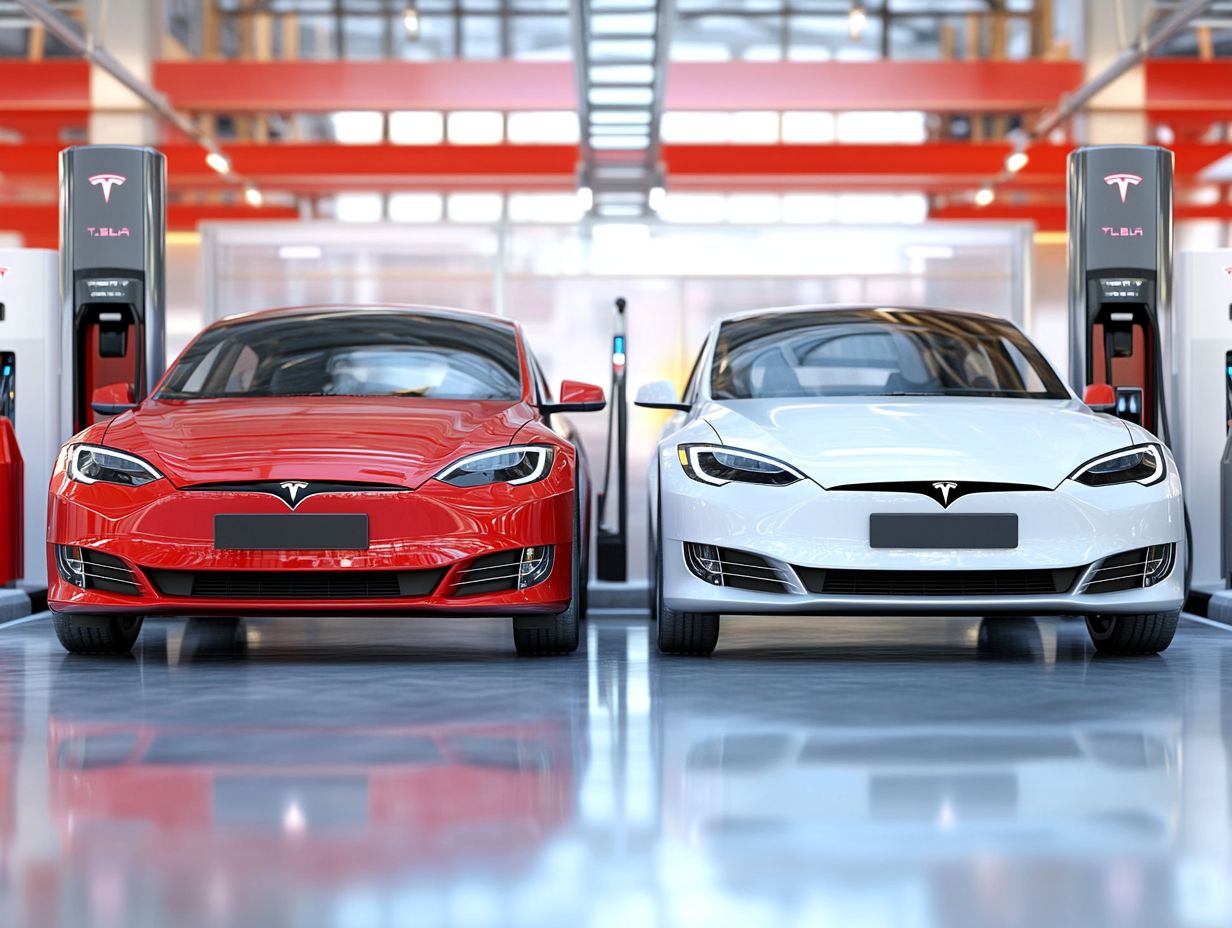
The initial purchase price, or sticker price, is a crucial factor for you when deciding between electric models and gas cars. It significantly influences your financial decisions. While it’s true that electric vehicles often come with a higher sticker price, performance comparison: gas vs. electric options, along with federal and state financial help, like those highlighted in the Inflation Reduction Act, can help offset these costs.
This financial assistance can effectively narrow the price gap, making that initial investment in electric models much more appealing. For example, certain states offer substantial rebates or tax credits that can dramatically reduce the effective price.
As a result, it’s essential for you to consider not just the upfront costs but also the long-term savings associated with reduced fuel expenses and maintenance. In many cases, electric vehicles can present a more attractive total cost of ownership when you take these factors into account, enabling you to make informed choices that align with your financial goals.
The Role of Long-Term Costs
Long-term maintenance and fuel costs play a pivotal role in shaping the overall cost of ownership for both electric vehicles and gas cars. These factors influence your choices based on annual expenses and projected long-term savings.
Electric vehicles usually require only occasional tire rotations and brake maintenance. In contrast, gas cars require regular oil changes, transmission servicing, and exhaust repairs expenses that can quickly add up.
This distinction helps you maintain a more manageable monthly budget while also highlighting the long-term financial advantages of electric vehicles. With fluctuating gasoline prices complicating fuel budgeting for gas cars, electric vehicle owners often enjoy the predictability of charging costs, ultimately enhancing their savings over the years.
Factors Affecting the Price of Electric and Gasoline Cars
Several factors influence the price of electric and gasoline cars, such as government support, tax credits, the availability of charging infrastructure, and the expected value when selling the car later. For a deeper understanding, check out the feature analysis of gasoline vs. electric engines.
As the EV market evolves, grasping these dynamics enables you to capitalize on state and federal incentives provided by entities like the U.S. Department of the Treasury.
Government Support and Tax Credits
Government support and tax credits are essential in making electric vehicles (EVs) financially accessible. They significantly shape the landscape of the EV market. Programs established under the Inflation Reduction Act, along with additional state incentives, can dramatically reduce the effective purchase price for you.
These initiatives not only motivate you to shift toward cleaner alternatives but also spur production and innovation within the industry. Various state programs offer further benefits, such as rebates and grants, making electric vehicle ownership even more attractive. Regional utility incentives may provide extra savings through lower electricity rates for charging.
Don t miss out on these amazing financial aids that can drastically cut your costs! By understanding the full scope of these benefits, you can maximize your savings while contributing to a more sustainable future. This proves that investing in electric vehicles can be a savvy choice both economically and for the environment.
Availability of Charging Infrastructure
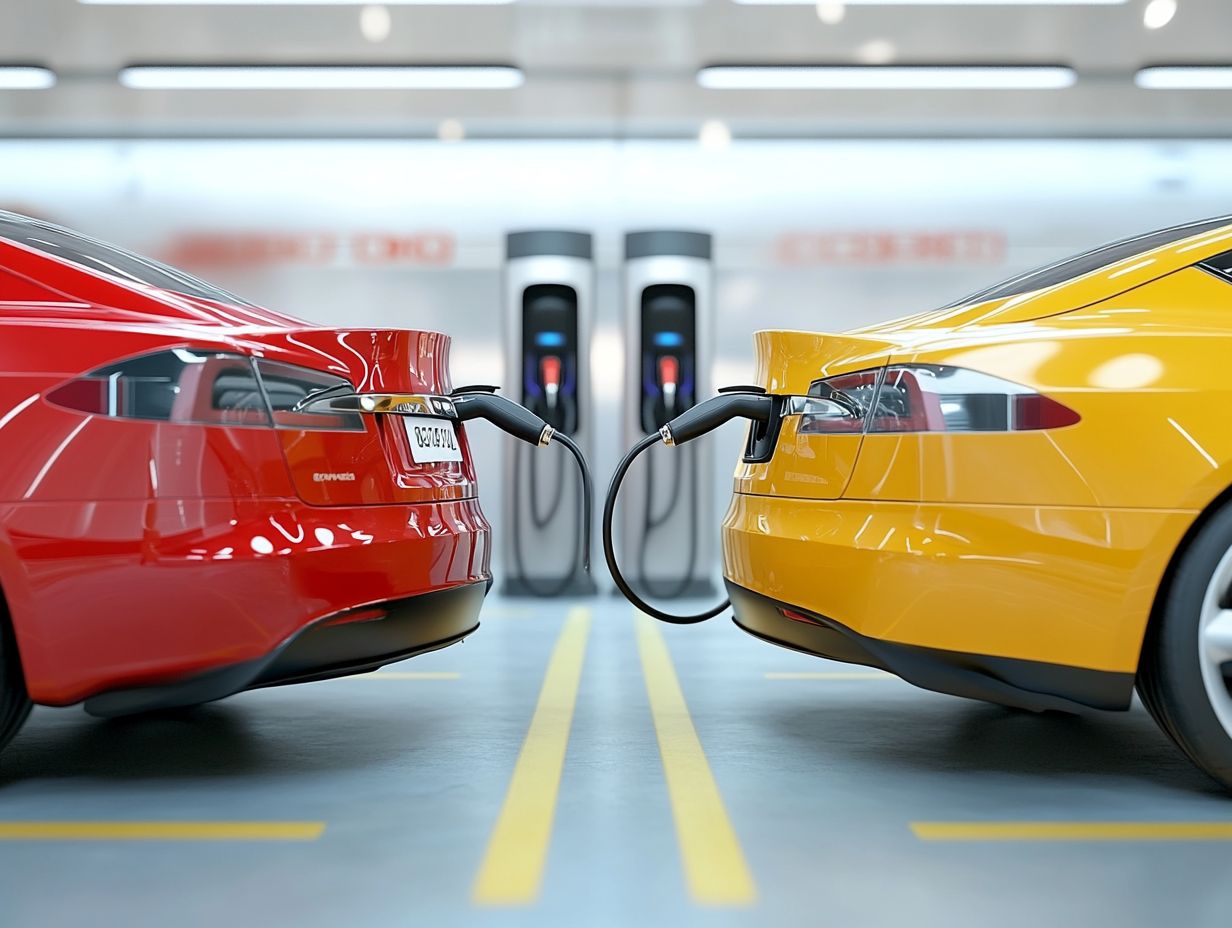
The availability of charging infrastructure significantly influences your decision to adopt an electric vehicle. It affects your driving patterns and charging habits. A well-established network of public charging stations enhances the practicality and convenience of owning an electric vehicle.
As you consider the shift to electric, access to efficient and reliable charging solutions becomes a key factor. Knowing there are well-distributed charging stations can alleviate range anxiety the fear of running out of battery power before reaching a charging station allowing you to drive with confidence.
Advancements in fast-charging technology help address concerns by drastically reducing wait times at stations. This seamlessly integrates electric vehicles into your everyday life. Challenges still exist, particularly in rural areas where the infrastructure is still catching up. Ensuring equitable access to charging facilities is essential for accelerating your transition to electric mobility.
Resale Value
When considering the long-term financial implications of purchasing either an electric or a gas car, resale value is crucial. Car depreciation can greatly influence your overall ownership costs. Understanding market share trends is essential to gauge the projected resale value of these vehicle types.
Electric vehicles increasingly capture market share. Their higher initial purchase prices might give you pause, but they typically offer better resale values than gas vehicles. This trend is driven by advancements in battery technology and rising consumer interest in sustainability.
Gas cars usually come with a lower upfront cost, but they tend to depreciate faster due to factors like climbing fuel prices and stricter emissions regulations. It s vital to consider not only the current market landscape but also the potential future value, influenced by shifting consumer preferences and regulatory changes.
Choosing the Right Car for Your Budget
Selecting the perfect car for your budget requires a thoughtful evaluation of both electric vehicles and gas cars. Consider your personal needs and financial goals to achieve optimal vehicle efficiency and cost-effectiveness.
As you explore your options, grasping the trade-offs associated with each type will enable you to make the best decision tailored to your unique circumstances.
Considerations for Personal Needs and Preferences
When weighing the options between electric vehicles and gas cars, consider your personal needs and preferences. Factors like vehicle range and charging habits significantly impact your satisfaction. Your lifestyle, driving patterns, and financial situation should play a crucial role in this decision-making process.
If you often set off on long road trips, gas cars might be more convenient, thanks to the extensive refueling infrastructure. Conversely, if you re an urban dweller with shorter commutes, you might prefer electric vehicles for their lower operating costs and enticing tax incentives.
The environmental impact of each choice resonates differently with you. Some may prioritize sustainability and thus opt for electric models. By understanding your unique needs like family size, budget, and convenience of charging options you can streamline your decision-making process, leading to a more gratifying driving experience.
Frequently Asked Questions
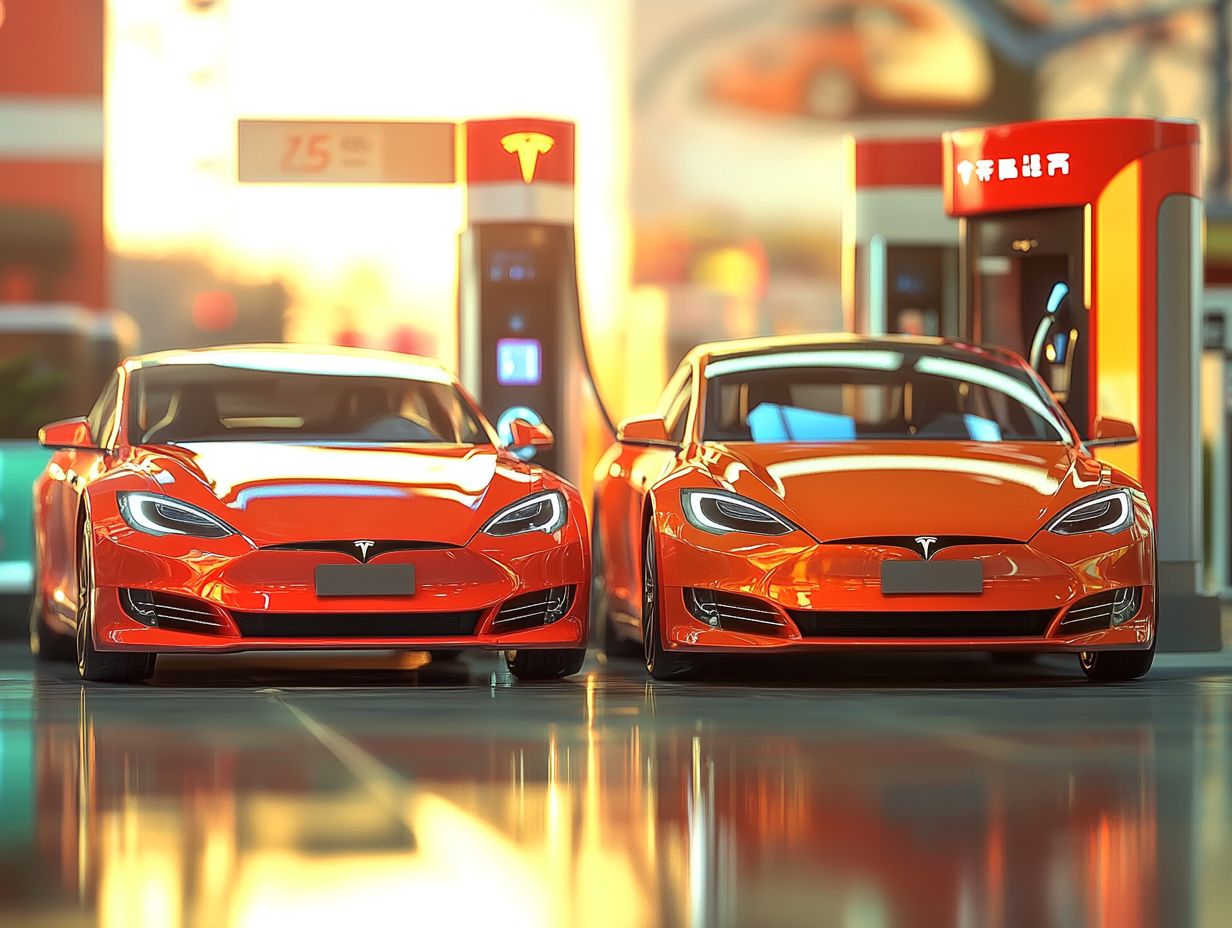
1. What is the main difference in price between electric and gasoline cars?
The price of electric cars is typically higher than gasoline cars due to the cost of battery technology and production. However, for a comprehensive understanding, it’s important to explore feature analysis: gas vs. electric vehicle features, as the overall cost of ownership includes other factors to consider.
Explore the electric vehicle options available today!
2. Are there any government incentives or tax breaks for purchasing an electric car?
Yes! There are federal and state incentives for buying an electric car. These include tax credits and rebates that help lower the car’s initial cost.
3. How do long-term maintenance costs differ between electric and gasoline cars?
Electric cars usually have lower maintenance costs since they have fewer moving parts. However, replacing the battery can be expensive.
4. Do electric cars save money on fuel compared to gasoline cars?
Absolutely! Electric cars can significantly reduce fuel costs since they don t use gasoline. Your savings will depend on local electricity prices and how efficiently your vehicle runs.
5. Are there any additional costs to consider when purchasing an electric car?
Besides the initial cost, you may need to buy a home charging station. Prices can range from a few hundred to a few thousand dollars, but savings on fuel and maintenance can make up for it.
6. Which type of car is more affordable in the long run: electric or gasoline?
This varies by situation, but generally, electric cars tend to have lower long-term costs. For those interested in the latest options, a luxury electric vehicles price comparison can provide valuable insights. As technology advances, the price of electric cars will likely become closer to that of gasoline cars.

